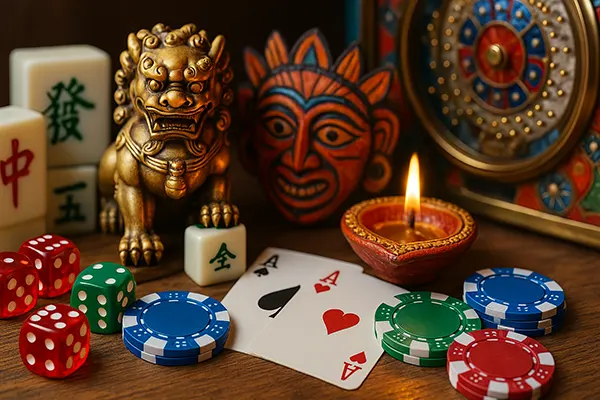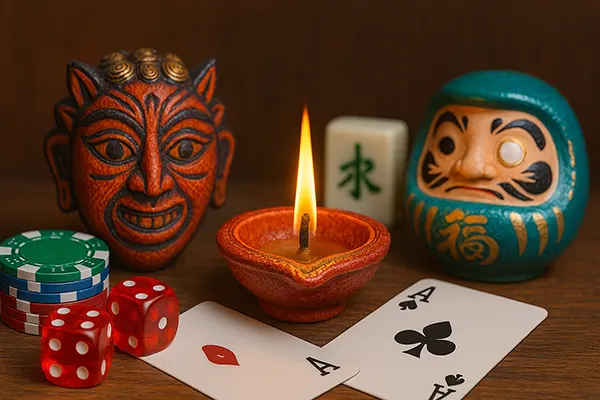
Gambling as a Cultural Element: Traditions, Myths and Taboos Around the World
Gambling is far more than a game of chance or entertainment. Across centuries and continents, it has been deeply woven into the cultural fabric of societies. From sacred rituals to social pastimes, and from harsh taboos to national obsessions, gambling reflects each culture’s values, beliefs and traditions. Let’s take a closer look at how gambling is experienced in different parts of the world.
Gambling Traditions in Asia and Their Cultural Meaning
In Japan, gambling is technically banned, yet the country is famous for the pachinko phenomenon. These arcade-like machines fill entire buildings, and while cash prizes are forbidden, winners exchange tokens for cash outside. Pachinko remains a culturally accepted form of entertainment, tied to modern leisure rather than taboo. It reflects Japan’s careful balance between adherence to the law and practical social enjoyment.
India presents a different perspective. Gambling is mentioned in ancient texts like the Mahabharata, where dice games led to major plot developments. Today, many states outlaw gambling, though lotteries and betting on cricket remain widespread. In Indian culture, gambling is seen as both a source of ruin and a test of fate, especially during festivals like Diwali, when card games are played to attract good fortune.
In China, gambling has a long history. Games like Mahjong, which blend skill and luck, have been played for centuries. Despite strict anti-gambling laws, betting remains common in practice, particularly in special administrative regions like Macau, where gambling is a cornerstone of the local economy. Chinese culture often links gambling to luck, prosperity, and destiny, especially during celebrations like Lunar New Year.
How Gambling Reflects Social Values
In many Asian societies, gambling is not purely about winning money—it is about community, tradition, and respect for ritual. Games are often played within families or social circles, particularly during holidays, emphasising bonding rather than profit. The types of games and the context in which they are played reveal much about the region’s social structure and collective mentality.
Gambling in these cultures often walks a fine line between legal restrictions and deep-rooted customs. Even where it is outlawed, communities find culturally appropriate ways to include it in celebrations. This contradiction illustrates how societies adapt legal frameworks to fit their traditions.
Furthermore, the connection between gambling and spiritual beliefs in Asia highlights how games of chance are often perceived as opportunities to communicate with fate. Rituals and symbols are frequently incorporated, turning the act into more than just a game—it becomes a meaningful experience.
The Role of Gambling in African and Indigenous Communities
Across various African nations, gambling practices range from modern sports betting to traditional games of chance played in rural settings. For example, in Nigeria and Kenya, sports betting has surged in popularity thanks to widespread internet access and mobile payments. However, traditional gambling involving animal bones, seeds or handmade dice still thrives in tribal communities and often serves a ceremonial function.
In many indigenous cultures across the African continent, gambling is deeply connected to rites of passage, storytelling, and ancestral worship. It is used to test wisdom, courage, and fairness, especially among youth. These games are not typically high-stakes but instead function as social tools that reinforce values and hierarchies within the community.
Even though gambling regulations differ across African countries, informal games are rarely criminalised within communities. Instead, they are perceived as extensions of age-old customs, passed down through generations. In places where formal education or infrastructure is limited, these games often provide one of the few accessible forms of entertainment and communal interaction.
When Gambling Becomes a Cultural Language
In tribal and indigenous contexts, gambling often functions as a cultural language. The rules of the game, the way winners are treated, and the rituals surrounding the activity all carry meaning. These customs convey respect, status, and history, forming a crucial part of identity for many groups.
The symbolic value of the items used in games—such as carved tokens, stones, or bones—adds spiritual depth to these practices. Winning is not always the ultimate goal; participation, fair play, and honour carry equal weight. This is starkly different from the commercial approach to gambling seen in other regions.
In recent years, some NGOs have even incorporated gambling-like activities into educational outreach in rural areas, using culturally familiar formats to teach numeracy or strategy. This blend of tradition and modern application underlines how gambling can evolve while preserving its cultural roots.

Gambling Laws and Taboos in Western and Latin American Countries
In Western Europe, gambling is generally legal and heavily regulated. The United Kingdom, for example, operates a robust licensing system and promotes responsible gambling through national campaigns. However, social attitudes can vary—some communities still associate gambling with moral decay, especially when addiction or debt is involved.
Meanwhile, in Latin America, gambling laws vary widely. Brazil only recently legalised sports betting in 2023, after decades of prohibition. Despite this, underground gambling was always part of the national fabric—Jogo do Bicho (the Animal Game) remains popular, particularly in Rio de Janeiro, where it originated in the late 19th century. Though technically illegal, it is largely tolerated and even seen as culturally significant.
In Catholic-majority countries like Mexico and Argentina, gambling often carries religious or ethical stigma, though casinos are still widespread. Many see gambling as a vice, but others embrace it as part of festive culture, particularly during local fiestas or carnivals. This duality mirrors the broader tension between law, faith, and popular practice.
The Fine Line Between Acceptance and Stigma
Across Western and Latin American cultures, the view of gambling oscillates between entertainment and excess. Public campaigns often focus on harm prevention, yet the economic contributions of gambling cannot be denied. In places like Spain and the UK, the industry supports thousands of jobs and generates substantial tax revenue.
At the same time, the rise of online gambling has made the issue more complex. It has introduced new challenges regarding addiction, privacy, and youth access, forcing governments to continuously adapt regulations. Despite this, many players see gambling as a recreational activity and an accepted part of their lifestyle.
This contrast between public health concern and cultural acceptance highlights a persistent ambiguity. While gambling may be frowned upon in official discourse, it thrives socially, especially when tied to tradition or celebration. This suggests that in many societies, gambling remains a reflection of cultural norms rather than a purely legal or moral issue.
